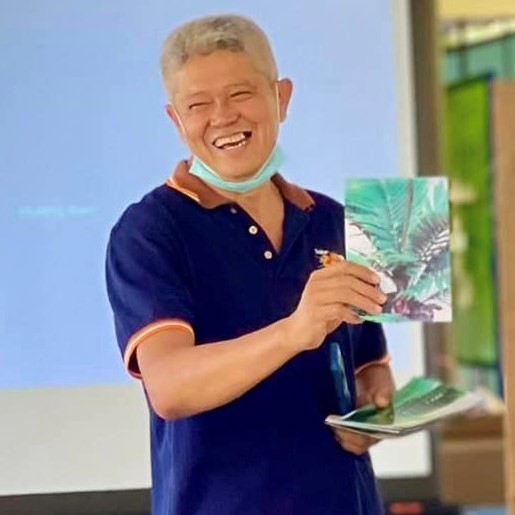
Trainers are often regarded as merely guest speakers. In the Sustainable Palm Oil Production and Procurement Project (SPOPP), however, our trainers are more than just regular trainers but also serve as training instructors, training facilitators, as well as technical inspectors tracking the farmer’s adoption of knowledge once the training has been completed.
With the SPOPP, many trainers continue to improve and enjoy what they do. In addition to being instructors who share information on different training topics, they play a crucial role in driving oil palm farmers to reach their goals towards achieving the Roundtable on Sustainable Palm Oil (RSPO) Standard and Certification.
Our past activities clearly demonstrate why our trainers are so vital. If any of the trainers are absent or even fall short in one or more of their qualifications, it will unquestionably have an impact on the project implementation. According to observed challenges during the trainers’ competence improvement, we have learned that the real situation might not resemble what trainers have been told in a classroom. Problem-solving in any unexpected scenario always stimulates and thrills our trainers. From our experience, we have gathered the following tips for other trainers to take into account when working with farmer communities:
Dedication: To improve self-confidence, the trainers must continue to study and practice training skills in all areas. It could be a verbal presentation, use of training media, or even approaches to ensure that farmers have gained information and awareness, as well as their acceptance and adoption of the practices taught.
Deliver Correct Knowledge: When it comes to a specific training topic, inviting a knowledgeable organisation, a specialist or expert, or obtaining reference documents from reliable sources is necessary to build more credibility in the training.
Database Management: The database is essential for effective operation and continuous improvement. Therefore, good database management is a crucial tool for streamlining data collection and data processing, as well as monitoring and evaluating success. However, verifying the accuracy of collected data, such as determining whether the possession and type of land title documents are legal, whether the planting year and planting area are correct, whether the mapping of farming plot boundaries is accurate, as well as other relevant information must all comply with the RSPO standard requirements.
Farmer Group Creation and Group Management: Since the RSPO defines independent smallholder certification as collective certification, success starts with everyone participating and working together to drive a clear and transparent workplan with the same objectives and goals.
Through taking real action, the trainers participating in the SPOPP project have developed and refined their training facilitation skills. The provided training materials and tools, meanwhile, are effective and match trainers’ needs. As a result, each of the elements can aid the trainers in boosting confidence and inspire them to change and advance their skills to become professional trainers.
Our trainer’s success stories:

“Being a trainer is a powerful role, the most challenging task in any position and comes with responsibility. The trainer will have to maintain and take control in any situation. Evolving problems must be resolved, along with consideration of the circumstances. I keep expanding my knowledge base. Importantly, ‘true knowledge’, ‘rhetoric’, ‘personality’, ‘positive attitude’, and ‘listening to the audience’ are key shortcuts to success. Thanks to mentors like GIZ and support from GGC, I was able to get over my fears and face the challenges of being a trainer at full capacity.”


Related Articles
- German Ambassador to Thailand visited SPOPP palm oil mills
- Five female leading farmers’ thoughts on sustainable palm oil production
- Successfully leading Thai palm oil production towards meeting global sustainability demands
- GGC, GIZ, local stakeholders signed MoU to support sustainable palm oil production and procurement in Thailand











